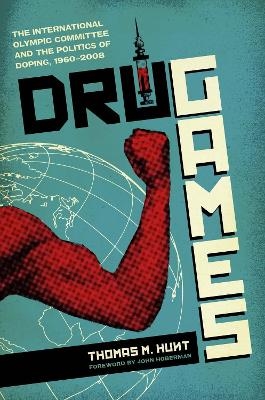
Drug Games
The International Olympic Committee and the Politics of Doping, 1960–2008
Seiten
2011
University of Texas Press (Verlag)
978-0-292-73749-5 (ISBN)
University of Texas Press (Verlag)
978-0-292-73749-5 (ISBN)
Based on research in both American and foreign archives, this first book-length study of doping in the Olympics connects the use and regulation of performance-enhancing drugs to developments in the larger global environment.
On August 26, 1960, twenty-three-year-old Danish cyclist Knud Jensen, competing in that year's Rome Olympic Games, suddenly fell from his bike and fractured his skull. His death hours later led to rumors that performance-enhancing drugs were in his system. Though certainly not the first instance of doping in the Olympic Games, Jensen's death serves as the starting point for Thomas M. Hunt's thoroughly researched, chronological history of the modern relationship of doping to the Olympics. Utilizing concepts derived from international relations theory, diplomatic history, and administrative law, this work connects the issue to global political relations.
During the Cold War, national governments had little reason to support effective anti-doping controls in the Olympics. Both the United States and the Soviet Union conceptualized power in sport as a means of impressing both friends and rivals abroad. The resulting medals race motivated nations on both sides of the Iron Curtain to allow drug regulatory powers to remain with private sport authorities. Given the costs involved in testing and the repercussions of drug scandals, these authorities tried to avoid the issue whenever possible. But toward the end of the Cold War, governments became more involved in the issue of testing. Having historically been a combined scientific, ethical, and political dilemma, obstacles to the elimination of doping in the Olympics are becoming less restrained by political inertia.
On August 26, 1960, twenty-three-year-old Danish cyclist Knud Jensen, competing in that year's Rome Olympic Games, suddenly fell from his bike and fractured his skull. His death hours later led to rumors that performance-enhancing drugs were in his system. Though certainly not the first instance of doping in the Olympic Games, Jensen's death serves as the starting point for Thomas M. Hunt's thoroughly researched, chronological history of the modern relationship of doping to the Olympics. Utilizing concepts derived from international relations theory, diplomatic history, and administrative law, this work connects the issue to global political relations.
During the Cold War, national governments had little reason to support effective anti-doping controls in the Olympics. Both the United States and the Soviet Union conceptualized power in sport as a means of impressing both friends and rivals abroad. The resulting medals race motivated nations on both sides of the Iron Curtain to allow drug regulatory powers to remain with private sport authorities. Given the costs involved in testing and the repercussions of drug scandals, these authorities tried to avoid the issue whenever possible. But toward the end of the Cold War, governments became more involved in the issue of testing. Having historically been a combined scientific, ethical, and political dilemma, obstacles to the elimination of doping in the Olympics are becoming less restrained by political inertia.
Thomas M. Hunt is Assistant Professor in the Department of Kinesiology and Health Education at the University of Texas at Austin, where he also holds an appointment as Assistant Director for Academic Affairs at the H. J. Lutcher Stark Center for Physical Culture and Sports.
Foreword by John Hoberman
Acknowledgments
Introduction
Chapter 1: Defining the Problem
Chapter 2: Testing Begins
Chapter 3: Nationalism Strikes
Chapter 4: Old Problems and New Leadership
Chapter 5: "In a Free Society, It All Depends on Us"
Chapter 6: Turning Point
Chapter 7: Toward a Unified Approach
Chapter 8: Challenge and Partnership
Chapter 9: A New Century
Chapter 10: Difficulties of Partnership
Conclusion
Notes
Bibliography
Index
| Reihe/Serie | Terry and Jan Todd Series on Physical Culture and Sports |
|---|---|
| Einführung | John Hoberman |
| Verlagsort | Austin, TX |
| Sprache | englisch |
| Maße | 152 x 229 mm |
| Gewicht | 454 g |
| Themenwelt | Sachbuch/Ratgeber ► Sport |
| Geisteswissenschaften ► Psychologie ► Sucht / Drogen | |
| Medizin / Pharmazie | |
| Sozialwissenschaften ► Soziologie | |
| ISBN-10 | 0-292-73749-1 / 0292737491 |
| ISBN-13 | 978-0-292-73749-5 / 9780292737495 |
| Zustand | Neuware |
| Haben Sie eine Frage zum Produkt? |
Mehr entdecken
aus dem Bereich
aus dem Bereich
Suchtkrankheiten in Klinik und Praxis
Buch | Softcover (2023)
Schattauer (Verlag)
48,00 €
en verhaltenstherapeutisches Manual
Buch | Softcover (2024)
Kohlhammer (Verlag)
39,00 €
Ein Praxishandbuch für Therapeuten, Pädagogen und Eltern
Buch | Softcover (2023)
Kohlhammer (Verlag)
46,00 €


